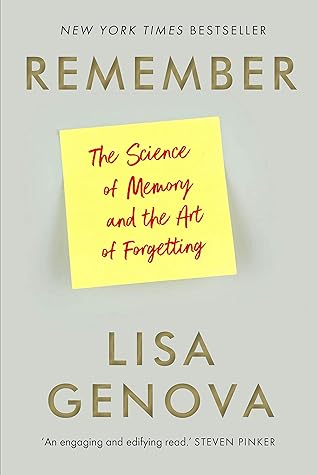More on this book
Community
Kindle Notes & Highlights
by
Lisa Genova
Our brains aren’t designed to remember people’s names, to do something later, or to catalog everything we encounter.
Creating a memory takes place in four basic steps: Encoding. Your brain captures the sights, sounds, information, emotion, and meaning of what you perceived and paid attention to and translates all this into neurological language. Consolidation. Your brain links the previously unrelated collection of neural activity into a single pattern of associated connections. Storage. This pattern of activity is maintained over time through persistent structural and chemical changes in those neurons. Retrieval. You can now, through the activation of these associated connections, revisit, recall, know, and
...more
Remembering is an associative scavenger hunt, a reconstruction job that involves the activation of many disparate but connected parts of the brain.
Noticing requires two things: perception (seeing, hearing, smelling, feeling) and attention.
unless you add your attention to seeing this Christmas tree, the activated neurons will not be linked, and a memory will not be formed.
You need focused attention to lay down a memory with strength and accuracy.
prefrontal cortex, and this is where the present moment is remembered.
Working memory only holds what you are paying attention to right now.
Life events infused with emotion are what we tend to remember long term
But most of life’s episodic memories are likely to be clustered between the ages of fifteen and thirty. Called the reminiscence bump,
highly superior autobiographical memory (HSAM) can recall the details of what happened from almost every day of their lives from late childhood on.
61 percent picked out the robber, but only 27 percent of the writers
writing about what they had seen dramatically compromised their ability to accurately remember what they had witnessed only a few minutes earlier.
Putting any sensory experience into words distorts and narrows the original memory of the experience.
Neisser and Harsch incorrectly assumed that the details of the original—in the students’ own handwriting, no less—would serve as a powerful cue for the students, triggering the accurate recall of what they had actually witnessed on January 28, 1986.
These folks all stuck with their more recent stories and scratched their heads over the mismatch, dumbstruck over their own original account.
You wear glasses if your eyes need help seeing. You can use Google if a word is stuck on the tip of your tongue.
Baker/baker paradox.
The Baker/baker paradox also explains why so many of us are bad at remembering names but not at recalling other details about a person.
recognition is always easier than recall.
Prospective memory is your memory for what you need to do later.
prospective memory is so poorly supported by our neural circuitry and so steeped in failure, it can almost be thought of as a kind of forgetting rather than a kind of memory.
our brains are terrible at remembering to remember.
Prospective memories rely on external cues to trigger their recall.
Ebbinghaus forgetting curve, this pattern is generally what happens to unsupported memory over time.
There are two main ways to resist the effects of time on memory: repetition and meaning.
You have to both perceive and pay attention to create a memory.
They recalled far more positive traits than negative unless they were told that the list of traits was about someone else.
We possess a positivity bias with respect to how we see ourselves.
you’ll have a harder time holding that information in your working memory when you’re sixty than at forty.
Processing speeds normally begin diminishing in our thirties, which means it takes longer to learn new information and longer to retrieve stored information.
you’re less able to block out distracting stimuli when you’re fifty than when you were thirty,
paying attention, decreasing distractors, rehearsing, self-testing, creating meaning, using visual and spatial imagery, keeping a diary—will improve memory at any age.
Paying attention is the number one thing you can do to improve your memory
rehearsal, self-testing, visual and spatial imagery, mnemonics, surprise, emotion, and meaning all improve memory.
prospective (what you plan to do), episodic (what happened), semantic (information you know), and muscle (how to do things) memories.
When the amygdala senses a challenge or threatening situation, it instantly sends an alarm signal to the hypothalamus. The hypothalamus then passes the baton via a neurotransmitter to the pituitary gland, which then releases a hormone into the bloodstream. The hormone then acts on the adrenal glands, which sit on top of your kidneys, telling them to release stress hormones.
Adrenaline is a fast-acting, short-lived emergency alarm,
enhances your senses and ability to focus while inhibiting your ability to think, so you can respond right away without taking the time to weigh the pros and cons.
Cortisol is a little slower than adrenaline.
it also shuts off the entire stress response.
it helps you form new memories about the stressful situation you’re in, but it impairs your ability to retrieve memories already made.
Cortisol can also act directly on receptors in the hippocampus to promote memory consolidation.
Without your adrenal glands, you would have a weaker memory for information and events that occur while you’re stressed than do people with adrenal glands.
plot the relationship between perceived stress and memory formation, the graph would take the shape of an inverted U.
When chronic stress continually alerts your amygdala, you’ll be spending too much time and energy in your primitive, emotional brain and not in your thinking brain. Stress inhibits your prefrontal cortex,
you’ll start losing neurons in your hippocampus.
Chronic stress inhibits neurogenesis in the hippocampus.
chronically stressed people were ten times more likely to develop cognitive impairment over five years.
yoga, meditation, a healthy diet, exercise, and practices in mindfulness, gratitude, and compassion, we can train ourselves to become less reactive,


